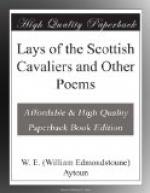By one of those singular accidents which we occasionally meet with in history, Graham, afterwards destined to become his most formidable opponent, saved the life of the Prince of Orange at the battle of St. Neff. The Prince’s horse had been killed, and he himself was in the grasp of the enemy, when the young cornet rode to his rescue, freed him from his assailants, and mounted him on his own steed. For this service he received a captain’s commission, and the promise of the first regiment that should fall vacant.
But even in early life William of Orange was not famous for keeping his promises. Some years afterwards, a vacancy in one of the Scottish regiments in the Prince’s service occurred, and Claverhouse, relying upon the previous assurance, preferred his claim. It was disregarded, and Mr. Collier, afterwards Earl of Portmore, was appointed over his head. It would seem that Graham had suspected some foul play on the part of this gentleman, for, shortly after, they accidentally met and had an angry altercation. This circumstance having come to the ears of the Prince, he sent for Captain Graham, and administered a sharp rebuke. I give the remainder of this incident in the words of the old writer, because it must be considered a very remarkable one, as illustrating the fiery spirit and dauntless independence of Claverhouse.
“The Captain answered, that he was indeed in the wrong, since it was more his Highness’s business to have resented that quarrel than his; because Mr. Collier had less injured him in disappointing him of the regiment, than he had done his Highness in making him break his word. ‘Then,’ replied the Prince in an angry tone, ’I make you full reparation, for I bestow on you what is more valuable than a regiment when I give you your right arm!’ The Captain subjoined, that since his Highness had the goodness to give him his liberty, he resolved to employ himself elsewhere, for he would not longer serve a Prince that had broken his word.
“The Captain, having thus thrown up his commission, was preparing in haste for his voyage, when a messenger arrived from the Prince, with two hundred guineas for the horse on which he had saved his life. The Captain sent the horse, but ordered the gold to be distributed among the grooms of the Prince’s stables. It is said, however, that his Highness had the generosity to write to the King and the Duke, recommending him as a fine gentleman and a brave officer, fit for any office, civil or military.”
On his arrival in Britain he was well received by the court, and immediately appointed to a high military command in Scotland. It would be beyond the scope of the present paper to enter minutely into the details of his service during the stormy period when Scotland was certainly misgoverned, and when there was little unity, but much disorder in the land. In whatever point of view we regard the history of those times, the aspect is a mournful one indeed. Church and State never was a popular cry in Scotland, and the peculiar religious tendencies which had been exhibited by a large portion of the nation, at the time of the Reformation, rendered the return of tranquillity hopeless until the hierarchy was displaced, and a humbler form of church government, more suited to the feelings of the people, substituted in its stead.




